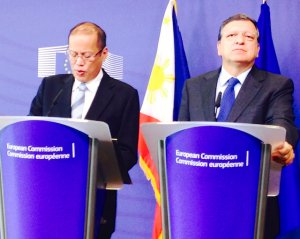BRUSSELS—The Philippines and the European Union are on the same page on how to resolve the territorial disputes in the South China Sea: the manner should be peaceful and rules-based.
This was made clear when President Aquino sat down Monday, Sept. 15, with European Commission President José Manuel Barroso at the Berlaymont here, as both leaders emphasized the need to settle differences peacefully, particularly through international arbitration.
With both the Philippines and the EU seeking the same route, Mr. Aquino said “China will have to listen,” noting that the EU is its “biggest trading partner.”
Beijing, which is claiming around 90 percent of the South China Sea, has rejected international arbitration, insisting that disputes should be resolved bilaterally with individual claimants like the Philippines.
“Let me stress that the European Union encourages all parties to seek peaceful solutions, through dialogue and cooperation, in accordance with international law – in particular with the UN Convention on the Law of the Sea,” Barroso said in a joint press conference with Mr. Aquino at the European Commission headquarters.
Barroso noted that the European Union is a “proud” party to the 1976 Treaty of Amity and Cooperation in Southeast Asia. The treaty seeks to “promote perpetual peace, everlasting amity and cooperation” in the region.
“We recall its fundamental principles, namely to settle differences by peaceful means, to renounce the threat or use of force and to effectively cooperate among partners,” he said.
Mr. Aquino assured Barroso that the Philippines “remains committed to advancing a peaceful, rules-based resolution to the disputes in the South China Sea, which is a sea known in our region by many names.”
“Like the European Union, we believe that the only viable and effective solution is one that is based on international law—in particular, under the UNCLOS,” he said. “This is the basis for the arbitral proceedings we initiated last year. We also continue to work with ASEAN and China towards the early conclusion of a legally-binding Code of Conduct in the South China Sea.”
